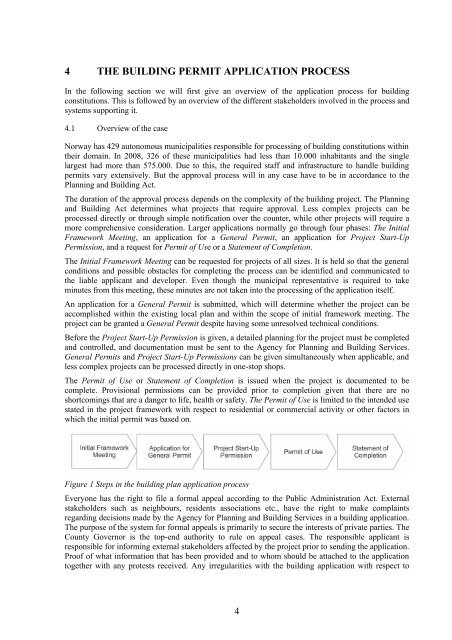Multi-channel provisioning of public services - Department of ...
Multi-channel provisioning of public services - Department of ...
Multi-channel provisioning of public services - Department of ...
You also want an ePaper? Increase the reach of your titles
YUMPU automatically turns print PDFs into web optimized ePapers that Google loves.
4 THE BUILDING PERMIT APPLICATION PROCESS<br />
In the following section we will first give an overview <strong>of</strong> the application process for building<br />
constitutions. This is followed by an overview <strong>of</strong> the different stakeholders involved in the process and<br />
systems supporting it.<br />
4.1 Overview <strong>of</strong> the case<br />
Norway has 429 autonomous municipalities responsible for processing <strong>of</strong> building constitutions within<br />
their domain. In 2008, 326 <strong>of</strong> these municipalities had less than 10.000 inhabitants and the single<br />
largest had more than 575.000. Due to this, the required staff and infrastructure to handle building<br />
permits vary extensively. But the approval process will in any case have to be in accordance to the<br />
Planning and Building Act.<br />
The duration <strong>of</strong> the approval process depends on the complexity <strong>of</strong> the building project. The Planning<br />
and Building Act determines what projects that require approval. Less complex projects can be<br />
processed directly or through simple notification over the counter, while other projects will require a<br />
more comprehensive consideration. Larger applications normally go through four phases: The Initial<br />
Framework Meeting, an application for a General Permit, an application for Project Start-Up<br />
Permission, and a request for Permit <strong>of</strong> Use or a Statement <strong>of</strong> Completion.<br />
The Initial Framework Meeting can be requested for projects <strong>of</strong> all sizes. It is held so that the general<br />
conditions and possible obstacles for completing the process can be identified and communicated to<br />
the liable applicant and developer. Even though the municipal representative is required to take<br />
minutes from this meeting, these minutes are not taken into the processing <strong>of</strong> the application itself.<br />
An application for a General Permit is submitted, which will determine whether the project can be<br />
accomplished within the existing local plan and within the scope <strong>of</strong> initial framework meeting. The<br />
project can be granted a General Permit despite having some unresolved technical conditions.<br />
Before the Project Start-Up Permission is given, a detailed planning for the project must be completed<br />
and controlled, and documentation must be sent to the Agency for Planning and Building Services.<br />
General Permits and Project Start-Up Permissions can be given simultaneously when applicable, and<br />
less complex projects can be processed directly in one-stop shops.<br />
The Permit <strong>of</strong> Use or Statement <strong>of</strong> Completion is issued when the project is documented to be<br />
complete. Provisional permissions can be provided prior to completion given that there are no<br />
shortcomings that are a danger to life, health or safety. The Permit <strong>of</strong> Use is limited to the intended use<br />
stated in the project framework with respect to residential or commercial activity or other factors in<br />
which the initial permit was based on.<br />
Figure 1 Steps in the building plan application process<br />
Everyone has the right to file a formal appeal according to the Public Administration Act. External<br />
stakeholders such as neighbours, residents associations etc., have the right to make complaints<br />
regarding decisions made by the Agency for Planning and Building Services in a building application.<br />
The purpose <strong>of</strong> the system for formal appeals is primarily to secure the interests <strong>of</strong> private parties. The<br />
County Governor is the top-end authority to rule on appeal cases. The responsible applicant is<br />
responsible for informing external stakeholders affected by the project prior to sending the application.<br />
Pro<strong>of</strong> <strong>of</strong> what information that has been provided and to whom should be attached to the application<br />
together with any protests received. Any irregularities with the building application with respect to<br />
4
















